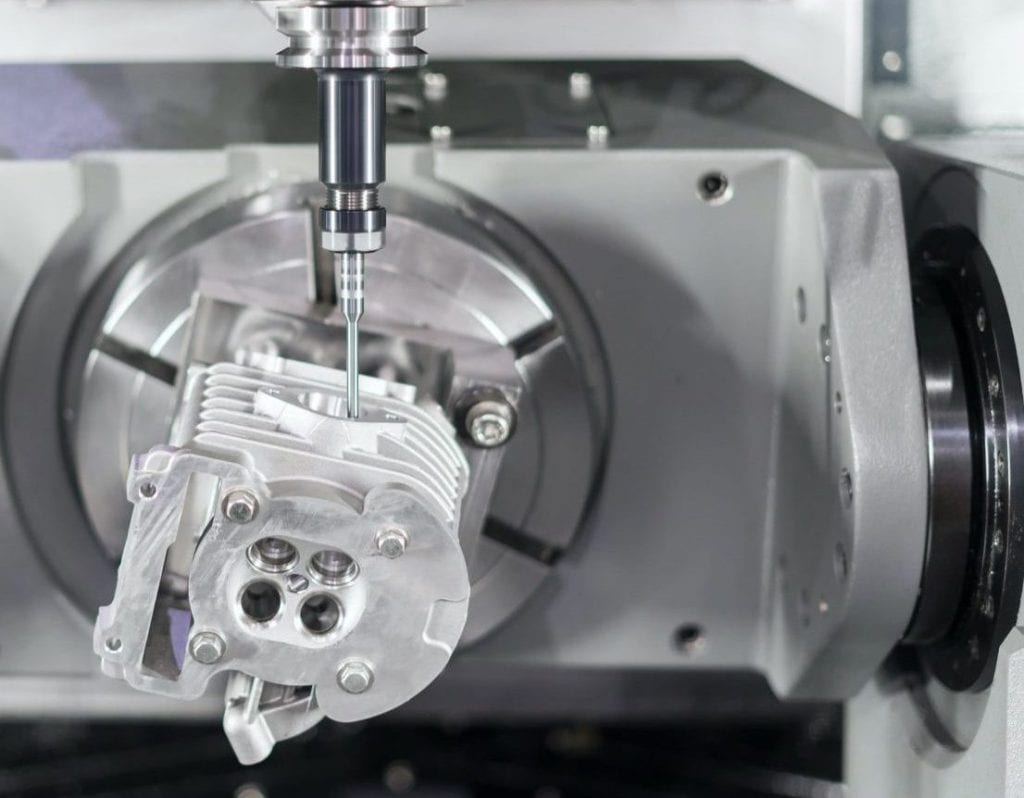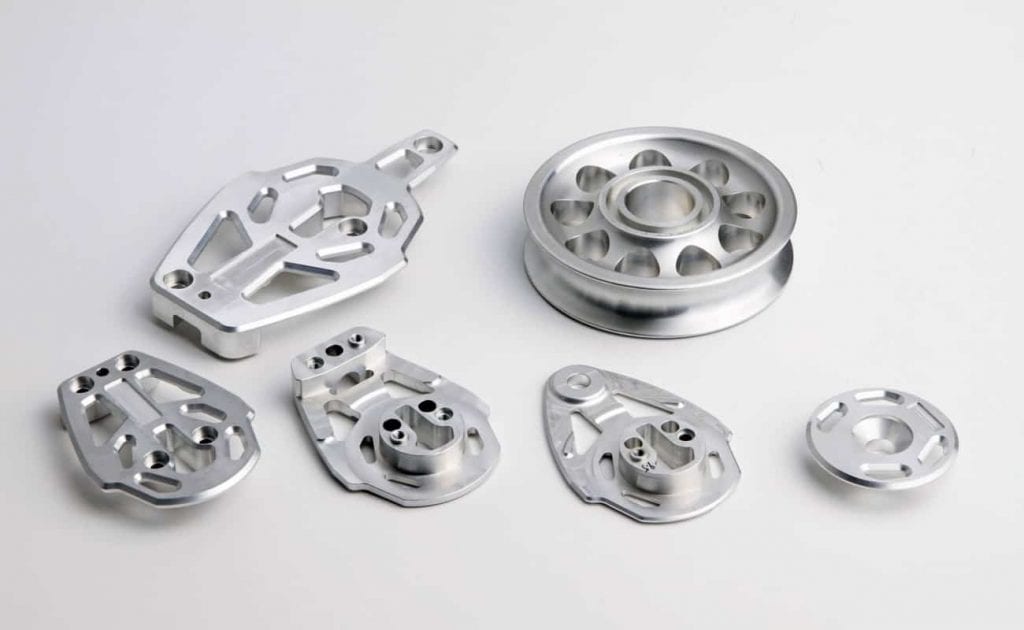Choosing the Right Metal for CNC Machining
For a fully comprehensive guide on CNC machining, check out of CNC Machining Guide.

For a fully comprehensive guide on CNC machining, check out of CNC Machining Guide.
Choosing the suitable metal for CNC Machining involves analysing various factors. Depending on the part or product being CNC machined, the metal you choose and its properties will play a vital role in the success of the final part. For example, the metal may need to be resistant to extreme temperatures or be resistant to bending or breaking under pressure. Corrosion resistance, workability, price, weight and cosmetic appearance all factor in when it comes to choosing the right metal.
Can a CNC Machine Cut Metal?
CNC machines can indeed cut metal and are widely used due to their high precision and accuracy. Depending on the material in question and its strength and hardness, CNC machining will yield different results and finishes.
{{cta-banner}}
What are the types of CNC Machining?
There are various CNC machines, and depending on cost, material, finish quality and design, a suitable CNC machine will be used. Popular methods of CNC Machining include:
CNC milling and machining are extremely common manufacturing processes, and it’s easy to see why. CNC (Computer Numerical Control) machining offers rapid production while requiring minimal human input compared to traditional methods. Benefits of this include a more cost-efficient workforce but, more importantly, less room for human error.
Not only are parts made swiftly, but CNC machining allows for extremely high levels of quality, repeatability and precision. There is also a wide range of materials that CNC machining can be used for, ranging from plastics, metals and ceramics.
There is a multitude of metals available for CNC machining. In this blog post, we will look at a selection of commonly used metals used within CNC machining. These recommendations also apply to CNC turning and multi-axis machining.

CNC Machining metals
Titanium
Titanium is a particularly strong and resilient metal whilst maintaining an excellent strength-to-weight ratio. It is highly workable and can be welded with ease. Although it conducts heat well, it possesses poor electrical conductivity. Whilst titanium responds well to anodising for a clean finish and protection, it reacts unfavourably to polishing. Titanium is lightweight and offers high strength, and has brilliant corrosion resistance and high-temperature resistance. For this reason, it is a popular choice for aircraft industry parts, biomedical and military. A popular titanium grade is Ti6Al4V (also known as TC4 and Grade 5).
Stainless Steels
There are many different grades of stainless steel, which are categorised into four main types: Ferritic, Austenitic, Martensitic, Duplex.
The most common Stainless Steel is Austenitic, which is our focus today. Their chemical structure includes Manganese, Nitrogen and Nickel, which provides good machinability and weldability. The three most common grades used in CNC machining processes are:
- SS304 - This is the most commonly used stainless steel and is highly corrosion-resistant. SS304 is frequently used for producing pipes, kitchen accessories, and within industrial and automotive industries. This stainless steel has better weldability and formability, meaning it is used for screws, machinery parts, car headers and food handling equipment.
- SS303 - This grade is often used to machine shafts, gears, nuts and bolts. SS303 is not ideal for heat-treating or cold forming due to the presence of sulphur.
- SS316 - This steel is incredibly strong yet is easy to weld, which makes it perfect for marine grade use. Again, the high resistance to corrosion makes it ideal for architectural, industrial and automotive purposes. Medical implants and surgical instruments also make use of this stainless steel. It is also implemented within the aerospace industry.
Aluminium
Aluminium is the most commonly used material in CNC milling processes due to its machinability, workability and versatility. It also provides a modest strength-to-weight ratio.
Aluminium 7075 is a high-grade metal with excellent strength. However, its strength can make it more challenging to produce designs with more complexity. Al7075 is ideal for CNC machined parts which require sustained durabilities, such as frames within the automobile and aerospace industries. Al7075 has great properties such as ductility, toughness, high strength with good fatigue resistance. This means it is a common material choice for high-stress structural components in aerospace.
Aluminium 6061, however, has far better workability and is generally considered to be an economical grade. It has good atmospheric corrosion resistance but low resistance to corrosion from chemicals. Al6061 is the most commonly used aluminium grade and is ideal for automobile parts, frames and much more. Aluminium 6061 is generally seen as a general-purpose aluminium, with good strength to weight ratio and good machinability. However, when exposed to saltwater, it has poor corrosion resistance and is not as strong as other aluminium alloys required for more demanding applications.
Magnesium AZ31: Although aluminium has an excellent strength-to-weight ratio, AZ31 can be up to 35% lighter whilst maintaining the same strength. As you can imagine, this means it is also higher on the price scale. Lightweight and durable, AZ31 is great for aircraft components, power tools and laptops. However, despite good workability, it does have some flammable properties.
Brass
Brass is highly versatile and is commonly used in plumbing systems. It also tends to be used in musical instruments and cosmetic applications, and home decor. This is because it is highly workable and can achieve an extremely high polish, making it aesthetically pleasing. In addition to this, it is naturally resistant to saltwater corrosion and is devoid of flammable properties. Brass is also used for electronic hardware, commercial fittings and aerospace parts. As it is a copper-zinc alloy, brass does not become brittle at low temperatures. It is a great choice for pipe fittings, with excellent thermal conductivity, and its attractive colour options make it a popular option for products that require a high-quality finish. Brass is also one of the easiest metals to CNC Machine.
Carbon Steel 1045
EN 1045 steel is highly workable and particularly suitable for welding. This steel grade shows high strength levels and tends to be more economical than stainless steel. Like stainless steel 303, it is often used for gears, nuts and other resilient mechanical parts. It is a good steel for applications requiring greater strength or hardness, such as shafts, axles, bolts and studs.
D2 Steel
D2 Steel is another member of the steel family and is significantly strong and durable. D2 Steel is also highly resistant to abrasion and wear. The strength and hardness of D2 steel make it suitable for parts that need high structural integrity and resistance to bending.
Arrange a Quote
Get It Made offers a wide range of materials for CNC Machining, including materials not listed above. Explore more of our CNC machining services on our website or check our CNC Machining Guide. Why not get in touch to discuss your material requirements and kick-start your project today? Arrange a CNC machining quote today, and our team will respond within 24 hours.













.webp)








